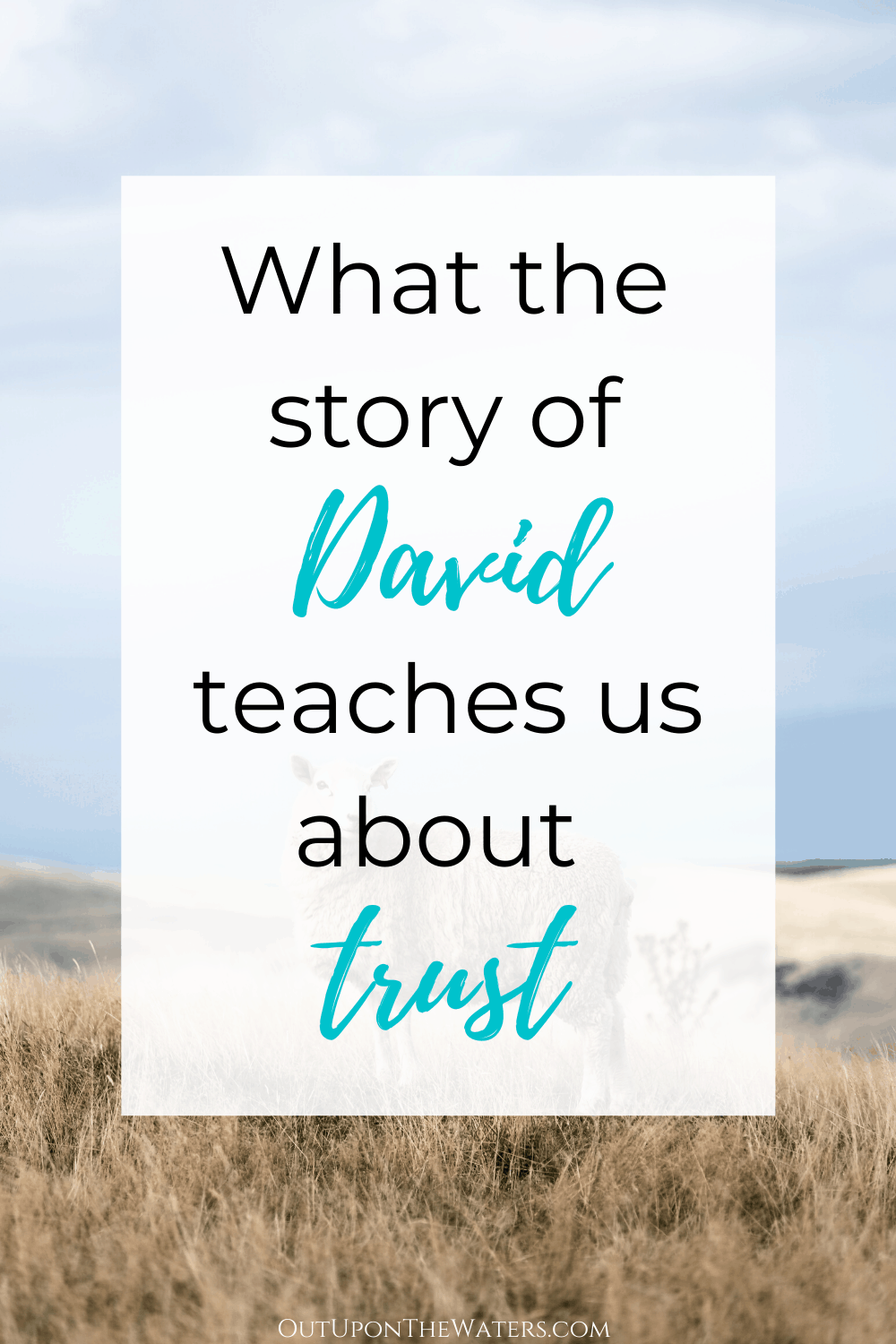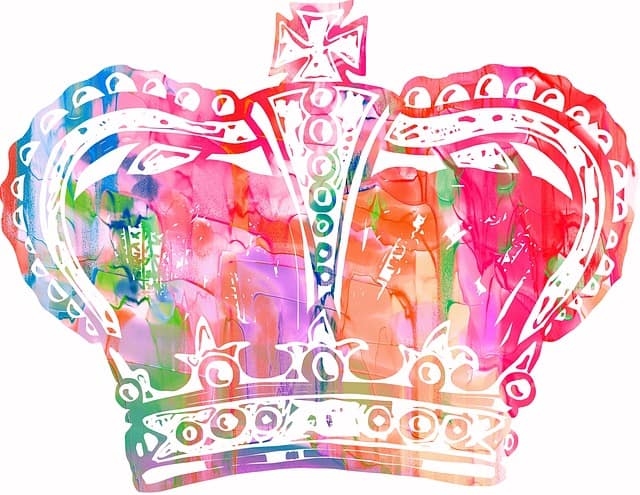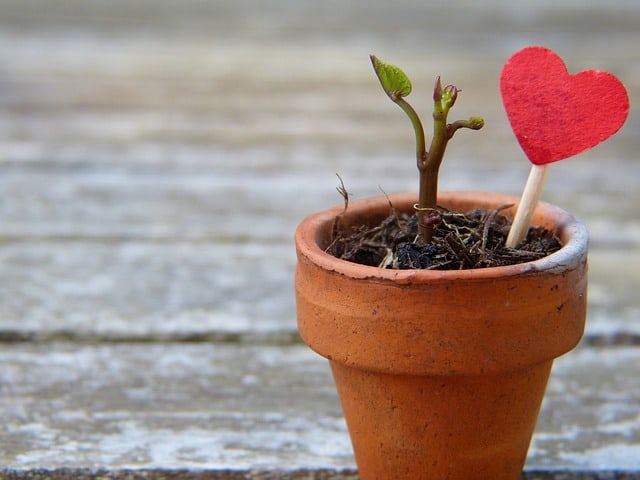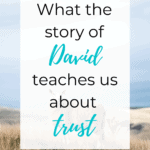The biggest, most important, most glaringly obvious and most hugely useful thing that I have gotten out of the story of David being anointed king is this: trust.
Trust in God.
Trust that God will keep you safe as you rescue sheep from the mouths of lions.
Trust that God is in fact working everything for your good, in all circumstances, even when it seems like your whole world is a mess.
Trust.
But before we get to the rescuing sheep from the mouths of lions part, let's back up a bit and look at the story of Samuel anointing David.

The Story: Samuel Anoints David
In 1 Samuel 16, Samuel anoints David as king, after God basically kicks Saul out of the position.
What's surprising about this story is that God chooses the youngest brother, the one who is out tending the sheep in the fields because no one thought that he was even in the running for king.
What happens is basically this:
God sends Samuel into Bethlehem to the house of Jesse. He tells Samuel that He (God) has chosen one of Jesse's sons to be king.
Samuel gets there and sees Eliab, the oldest and the tallest, and immediately thinks that this must be the guy that God wants to be king.
God replies, "Don't judge by his appearance or height, for I have rejected him. The Lord doesn't see things the way you see them. People judge by outward appearance, but the Lord looks at the heart" (1 Samuel 16:7).
Samuel and Jesse go through all of Jesse's sons, and God rejects them all.
It is not until Samuel asks Jesse, "Are these all the sons you have?" that Jesse seems to remember David.
Oh....That's right. There's one more out in the fields, watching the sheep and the goats. (Funny, isn't it? That he's watching the sheep and the goats?)
So Jesse sends for David, and God says, "This is the one; anoint him" (1 Samuel 16:12).

Why David is a Surprising Choice
David wasn't the obvious choice for king. He was the youngest, which means that he was last in line for succession and birth rights. He was also likely the smallest and the weakest, given that he was in fact the youngest.
The obvious choice was Eliab.
We would expect Eliab to be chosen king because of his position in the family. We learn later, though, that Eliab has a temper and he is distrustful of David, perhaps signalling a nature that is more generally distrustful (1 Samuel 17:28).
And we know that God "looks at the heart".
So what's in David's heart?
What's in David's Heart?
What we find in David's heart is this:
- He is brave. Later in the story, he kills the giant, Goliath, when everyone else is afraid to do battle with him. We learn that, as a shepherd, he rescues lambs from the mouths of lions and bears. (Note why he is brave: because he trusts that God is in control.)
- He is confident in God’s power and trusts that God will see him through life’s struggles. When he offers to do battle with Goliath, he displays confidence in God: “The Lord who rescued me from the claws of the lion and the bear will rescue me from this Phillistine!” (1 Sam 17:37). David has a true and genuine faith.
- David has a truly grateful heart. Psalm 30: “I will give thanks unto thee forever”.
- David is reliable. He keeps the sheep, which is and lonely and dirty job, but he does it because that’s what he has been assigned to do. He even places his life on the line to protect those sheep.
- David has a truthful nature. When David sinned (a pretty massive sin involving adultery and what amounts to murder), he admitted his sin to God and was forgiven.
- David has a transparent life. David prayed (Psalm 26:2) that God would examine his life. “Search me, O God, and know my heart: try me, and know my thoughts.”
God sees this in David. God knows David better than David knows David.
God also knows you better than you know you.
When the time comes to select a new king, God doesn’t judge by outward appearance, but rather “looks at the heart” (1 Sam 16:7).

What David Teaches us About Trust
One thing we can conclude from our examination of David is that God is looking for men and women who are faithful in the small things, thankful in all things, truthful always, transparent before Him and the world, and trust totally in His word.
But the one thing that seems to stand out the most is TRUST.
David trusts God so completely that he is willing to face down bears and lions to rescue one of his sheep.
He is also willing to do hand-to-hand combat with the nine-foot giant Goliath because he firmly believes that, “The Lord who rescued me from the claws of the lion and the bear will rescue me from this Phillistine!” (1 Sam 17:37).
How many of us would walk up to an armed giant with nothing but a slingshot and a handful of stones and say, “I trust that God’s got this”?
Probably not me.
David's trust is astounding.
The Parable of the Mustard Seed + Trust
The parable of the mustard seed (Matt 13:31-32) shows us the power of trusting God.
There, Jesus says that, "The Kingdom of Heaven is like a mustard seed planted in a field. It is the smallest of all seeds, but it becomes the largest of garden plants; it grows into a tree, and birds come and make nests in its branches."
Like a mustard seed, even a small amount of faith can grow into something strong and magnificent.
David’s trust in God allowed him to rescue sheep from the mouths of lions, to defeat Goliath, the nine-foot giant, with only a handful of stones, and to conquer countless enemies as king of Israel.
And so, a question to ponder as you think about David and his trust in God to work all things for his good, is this: Who do you trust?
Do you trust God to provide for you in all circumstances?
Do you trust him to rescue you from the mouths of bears and lions?
Or do you trust in things? In circumstances? In relationships, and mortgages, and jobs, and accomplishments?
Do you trust in your own power more than in that of God?
Trusting in these other things can be disappointing and exhausting. (In fact, it is always disappointing and exhausting, since all of these other things are temporary. They don't last. We are happy and secure when we have them, and anxious and depressed when we don't.)
Learning to trust in the love and the power of God gives you a security that allows you to face lions, rescue sheep, and say, "No big deal. I trust that God's got this."
For further reading about trusting God and implementing this principle in our own lives, check out my story about what turning down a job taught me about worldly standards and trusting God.


This has brought me to tears. I am also a final year PhD student and i am struggling with the fear that I may not be able to graduate on time looking at the circumstances at hand I have been praying and praying but things just keep going wrong with my experiments and sometimes I am mad at God for allowing this to happen. So I am in a place where my faith is very fragile and yet I know there is no other rock! So I was reading some psalms of David and i noticed that they all pointed to the sheer trust he had in God, That made me start searching on the internet about topics relating to David’s trust in God that’s how I found myself here.
When you asked if our trust is in circumstances, things,relationships, achievements(this is me); I broke down and cried because it’s my heart issue but at the same time it is so hard for me to see things getting better especially after I have been praying for my work so so long and things just keep going wrong. I am the only Christian in my science lab and being the only one in this predicament just makes me ask ‘why me God?’ I know it is written that God works all things for our good but I don’t know how this is gonna work for my good. I can’t even spend an hour with God without my head being crowded by worry and all the what-ifs and immediately my focus shifts and I can not pray anymore. Anyway, there is a lot to say but thank you for putting this out there so that we can be encouraged, May God somehow help me to find my first love for him again and to trust him completely. God bless you! Oh, btw you wrote Saul in some parts where I believe it should be Samuel.
Hi Daisy. Ahh! The PhD. Let me tell you, I spent a solid weekend crying in public as I was nearing the end – that “I’m not doing this right, I’m a total failure as a human being” period of the PhD. And another solid month shouting at God that if he wanted this dissertation complete, then HE would have to write it (he came through on that). I don’t have any answers for you, unfortunately, other than to say that you are NOT alone. There are so many of us who go through this! My weekend crying in public led to the revelation that actually a lot of women specifically go through this, weirdly enough (thank you, patriarchy?). Also: you WILL get through this, and there IS life on the other side of the PhD. Something that helped me was going through the beginning of the Psalms, especially, and claiming that angst and despair – and ultimately trust – as my own. Psalm 3 and 4 come to mind. “Lord, how many are my foes! How many rise up against me! Many are saying of me, ‘God will not deliver him.’ But you, Lord, are a shield around me, my glory, the One who lifts my head high….” And “Answer me when I call to you, my righteous God. Give me relief from my distress; have mercy on me and hear my prayer.” You’ve got this. God’s got this. <3
Comments are closed.